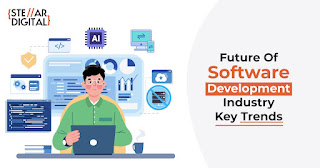Cross-platform development:
Due to the growing difficulties in
developing for certain platforms, such iOS and Android. Businesses or
organisations that specialise in cross-platform development of software.
By using a single code base to handle many
platforms, cross-platform
app development services reduces the need for additional engineering
staff.
Low code / No code platforms:
By streamlining the entire development
process, the visual approach to software development helps quicken delivery.
Giving developers the freedom to streamline the creation of a wide range of
solutions by automating and abstracting each stage of the software lifecycle.
The low-/no-code platforms have their own
set of difficulties, particularly with regard to the future, adaptability,
scalability, and security of software developers.
Because the apps created using low- or
no-code are not robust enough or flexible enough to support upgrades, low- or
no-code platforms are only intended for limited use.
Artificial intelligence and machine
learning:
You may have heard numerous experts claim
that artificial intelligence and machine learning are crucial future
technologies.
But a lot of them have missed to mention
that significant bandwidth and processing power are needed for both AI and ML.
The normal business network does not have
access to the resources needed to run AI/ML-based technologies.
AI/ML is replacing conventional software
development processes by utilizing more effective techniques that boost output
and reduce marketing time. As a result, AI is expanding quickly across the IT
industry.
By 2025, the income created by the usage of
AI technology is expected to reach $126 billion globally, according to market
research firm Tractica. Developers can increase their efficiency throughout the
software development cycle with the help of AI and ML technologies.
Because these technologies represent a
future trend in software development, many companies and developers are
embracing and implementing them.
Serverless computing:
The demand for serverless computing will
rise by 22.6% between 2022 and 2026, predicts a Mordor intelligence report. (https://www.mordorintelligence.com/industry-reports/cloud-monitoring-market)
Using web browsers on smartphones, tablets,
laptops, etc., serverless computing allows users to access the entire
computational infrastructure from a single source. Companies can create apps
without hosting or managing servers.
More and more start-ups are using
serverless computing to support services for the modern workplace. Serverless
computing is also less expensive because there is no need to buy and maintain
the hardware traditionally used for internal infrastructure.
Conclusion:
Technologies and trends are going to emerge
time-to-time in the software development industry. But the IT and software
development company should focus on market demand and expectations. If
they are fulfilled with the help of these emerging technologies then they
should go for it. If not then reject it its not like they need to adopt every
emerging trend or technology.




0 Comments